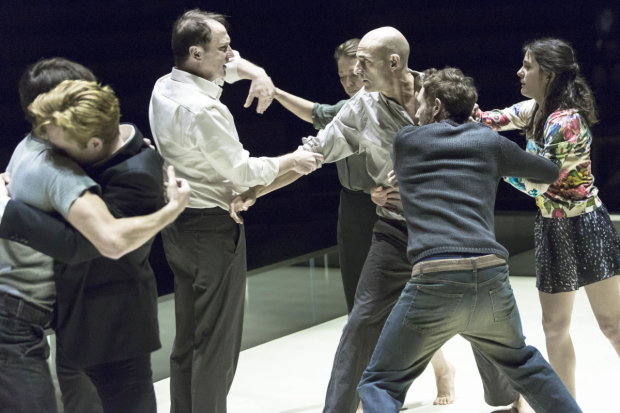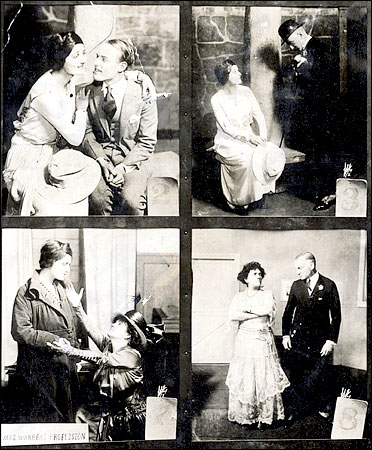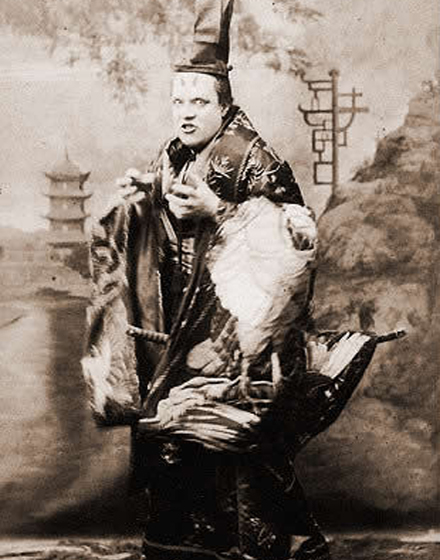Of Censors and Correctors (Part II)
This is part II of Michael Feingold's latest "Thinking About Theater" column. Click here to read part I.

(© Jan Versweyveld)
The censorship exerted by the Lord Chamberlain’s office over the British stage from 1737 to 1968 had always been a source of comedy for educated Britons, as much for its failure to prevent cheap double-entendre farces — in which the comedians’ silent leers and smirks took the place of explicit dialogue that the censors could delete — as for the serious plays, wholly devoid of sensationalism, which instantly provoked banning by their willingness to tackle a "forbidden" topic openly.
Incest, one of the Lord Chamberlain’s major no-no's, gave the Victorian intelligentsia ample opportunity for mocking the censorship, and also provided a possible way around it: In 1886, admirers of the poet Percy Bysshe Shelley, seeking to produce a staged reading of his play, The Cenci (1819), found every theater closed to them. The play’s tragic subject, a famous case of incest in 16th-century Italy, was an unlicensable taboo. So the Shelley Society rented a theater in Islington for a private meeting of its members (who included Robert Browning, Oscar Wilde, and Bernard Shaw), and put on The Cenci for members only. (The censor didn’t allow a public performance of Shelley’s play till 1922, three years after its centennial.)
Following the Shelley Society’s example, small members-only theater clubs sprang up in London. To trace the history of serious drama on the British stage from 1890 to 1968 means following their evolution, from J. T. Grein’s Independent Theatre, which unveiled Ibsen’s Ghosts, Shaw’s Mrs. Warren’s Profession, and Wilde’s Salome, to George Devine’s Royal Court Theatre, where John Osborne’s Look Back in Anger and a host of other "impermissible" plays began, all the way down to Edward Bond’s Early Morning (1967), the last play ever banned in toto by the Lord Chamberlain’s office. (Surreal and horrifying, Bond’s play virtually invited the ban by featuring, among its array of shocks, a lesbian love affair between Florence Nightingale and Queen Victoria.)

(Billy Rose Theater Collection, New York Public Library for the Performing Arts)
While the private-club policy flourished, artists and producers who commanded a larger public pounded their heads vainly against the unyielding wall of the censor’s ban. Three leading Edwardian actor-managers, including Herbert Beerbohm Tree and John Martin-Harvey, tried and failed to get permission to stage Sophocles’ Oedipus Rex; Olivier’s performance of the role after World War II was the Theban king’s first appearance on a public London stage in over 200 years. The Edwardian managers’ resentment was aggravated by the censor’s continued allowance, on operatic stages, of Wagner’s Die Walküre: Apparently brother-sister incest was OK if sung in a foreign language.
But if the ban on incest in classical tragedy had been somewhat relaxed by the 1940s, new disapprovals had arisen to take its place. Homosexuality, one of that era’s hottest topics, as it still is in many areas today, became in the 1940s and '50s the Lord Chamberlain’s bête noire. The door was slammed on Sartre’s No Exit and on the Goetzes’ adaptation of Gide’s The Immoralist, along with countless lesser specimens. Ultimately, the huge Broadway success of two American plays, after a prolonged fight, led in 1956 to the event that undermined the censorship, preparing the way for its abolition.
Under the aegis of Hugh "Binkie" Beaumont, who directed the largest and most powerful of London’s commercial producers, H.M. Tennent Ltd., one of the West End’s larger theaters, the Comedy (today the Harold Pinter), was turned into a private club, with only subscribing members allowed in to see those two scandalous plays whose authors had refused to make the cuts demanded by the Lord Chamberlain’s office: Arthur Miller’s A View From the Bridge and Tennessee Williams’ Cat on a Hot Tin Roof. (For those who can’t recall anything gay about Miller’s play, it features a false accusation of homosexuality and a male-male kiss — not consciously desired by either character but censorable even so.)

It seems absurd now, with both plays regarded as established classics that have undergone repeated revivals on both sides of the Atlantic; with an Anglo-American Cat fresh in our minds and a British View, staged by a Belgian director, on its way over here. And, truth be known, it seemed absurd to everybody involved with London playgoing in 1956, except perhaps the staff of the Lord Chamberlain’s office: The New Watergate Theatre Club, as the private organization was loftily called, attracted 13,000 subscribers with its initial offer. By the time the news came that London would see Kim Stanley embody Williams’ Maggie the Cat, the number had swollen to 64,000. The Lord Chamberlain is not an elected official, but the vote to eliminate his censorial duties was running high.
And the reasons for the negative votes were plentiful — 231 years’ worth of reasons, from driving Henry Fielding off the stage to dampening the prospects of great plays like Granville Barker’s Waste. The censorship had made a jackass of itself in the 1840s by initially forbidding performances of Dumas’ Lady of the Camellias in English while permitting it in French. (The result was a memorable Punch cartoon in which a respectable matron haughtily explained, "We have come to see the acting. We have no desire to understand the play.") It had jackassed itself again in the 1930s by banning Marc Connelly’s The Green Pastures — just in time for its film version to break box-office records at British cinemas. It had nearly provoked riots in Dublin by attempting to suppress the Abbey Theatre’s production of a Bernard Shaw one-act banned in England. And it had seemed to let a foreign government tell it to suppress a previously licensed and deeply loved Gilbert and Sullivan operetta.
Yes, you read that right. In 1906, with Japan’s Prince Fushimi about to make a state visit to England, the Lord Chamberlain’s office, acting overcautiously, banned The Mikado. The timing was especially unlucky: The d’Oyly Carte company was about to open a lavish new production, into which it had sunk 5,000 pounds. Gilbert was apoplectic. Prince Fushimi, allegedly, was disappointed, and told a Japanese journalist that he had looked forward to seeing the work performed. For a final irony, when the British High Command made its ceremonial visit to the Prince’s flagship, the Japanese naval band piped them aboard to — a suite of tunes from The Mikado. The bandmaster later said he understood it to be prototypically British music. On this irony, with The Mikado again under siege from today’s unofficial censors, let us conclude.
Michael Feingold's next two-part "Thinking About Theater" column will appear on consecutive Fridays October 23 and 30.
Michael Feingold has twice won the George Jean Nathan Award for Dramatic Criticism, most recently in 2015 for his "Thinking About Theater" columns on TheaterMania, and has twice been a finalist for the Pulitzer Prize in Criticism. He serves as chairman of the Obie Awards and has also worked as a playwright, translator, and dramaturg.










